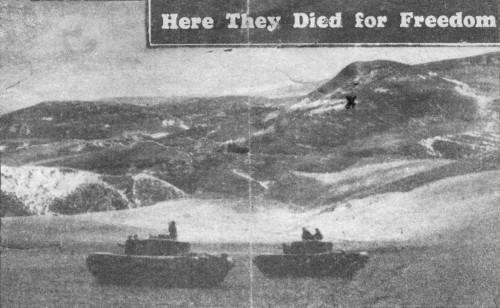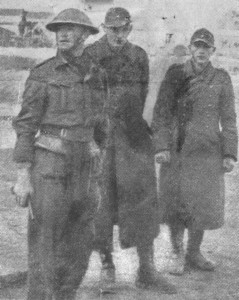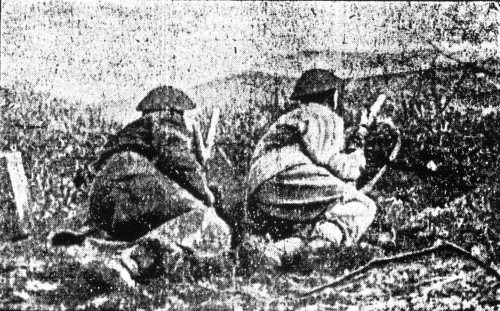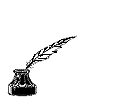|
Very soon we were on our way and for the first time from leaving England, I began to have the feeling of "butterflies in the stomach". All troops on going into action for the first time have this experience of fluttering in the stomach. It is mainly caused by the tension the body undergoes, and the mind when one thinks about action. I don't think it is the thoughts of being killed, it is more the uncertainty of not knowing what is going to happen. Soon we were passing signs of the war. The Germans had retreated into the range of hills on our first landings being made and had formed solid defences in the rocky hillsides. What a legend Longstop had already become, it had laid right in the front line, the fortress of the Merjerda Valley, the Gateway to Tunis from the West. It was no use ignoring Longstop and going round it. Even if our forces had done this, the Germans would still command the surrounding heights, enabling them to shell the two roads leading to Tunis. They could break up our convoys also launch counter attacks. On Longstop, the Germans had dug deep trenches which had deep shelves well below the surface. During a barrage from our 25 pounder guns, the enemy lay under these shelves in safety. It was only in the very last stages of an attack that they had to put their heads out. This I all knew from the information our Company officer had obtained from official sources. Now we were on our way to help play a part in the Tunisian campaign. It was nearly nightfall when we arrived at our Battalion H.Q. It was situated near a derelict farm house which was partly damaged by shell fire. Close to a haystack our platoon rested while I waited for orders. I could now hear gun fire and the sound of heavy shelling. I was not sure if it was ours or the Germans, then, when a shell landed quite close to our area, I realised these were enemy shells falling. We finished our tacky rations and were issued with fresh tins of bully and biscuits, which we stowed away in our small packs. Weapons were checked arid then we moved off into the night. It started to rain again and throwing our groundsheets over our shoulders, we trudged through the night, our whereabouts unknown, although as we were now in battle dress order I knew this could be the real thing. The road was now a soggy mass of ruts and holes. We passed a row of graves on the roadside with small crosses, one or two of them having a tin helmet placed on the top. I saw a group of tanks on my left as I slopped through the mud, the crews were attempting to pull large groundsheets over the sides of the tanks to give them a certain amount of shelter. Then we broke off the muddy road and made our way through a small wood pitted with mortar bomb holes and blasted trees. I could now hear the sound of rifle fire mingled with the occasional bursts of machine guns. We arrived on the edge of the wood, here we stopped and the officer came back to me and informed me that we were now to climb a very steep elope which would lead to a cave in the side of the hill. There we hoped to find No.4 Company of our Battalion who we had come to reinforce. White tapes guided us up the rocky slope which was slippery with the rain. This must have been previously a mine field now cleared by the sappers, and a marked route made with the white tapes towards our troop's positions. Now the firing was becoming much closer, also the sound of mortar bombs exploding could be heard not very far away. Then I heard a challenge from the front where our officer was and I realised we had arrived at our position. Our Company H.Q. was in a cave blasted out of the side of the hillside, here I reported to the Company officer. Then along with a section of Guardsmen, I was led out again by the platoon sergeant and struggling along behind him with the section. We relieved another section which had dug in on the top of a ridge about one hundred yards from our Company H.Q. I was given the time of stand-to in the morning to come and was told that the German positions lay about five hundred yards across a small valley which separated our positions. On my left was another section commanded by Sgt. Harry Hipkins, whom I knew when I was at Regents Park. He crawled over to our position and for a few minutes, we chatted, which gave him the chance to explain more to me about the positions we helped to defend. I learned that the Battalion had been in action two or three times since arriving in the positions. There had been casualties but he informed me the German casualties were much higher than ours, I was to realise this when daylight came. The night went uneventful except for firing going on well towards our left, this firing kept on all night. At stand-to next morning I could see over the trench the view in front of me. Peering through the small spy holes made in the trench top, I could see bodies dotted all over the lower slopes and into the valley below. Grey bodies as well as khaki clad ones. This was the first time I had seen a battle field and it was not a pleasant sight. About ten yards in front of our section position lay a body, stretched cut, the face now showing up in the sunlight which daybreak had now brought. I could see no sign of wounds. I felt as if I wanted to rush out and drag the body back. The sight of that face looking up into the sun seemed to hold my attention. My section too was taking in the surrounding land. I went round them talking to them and telling them to be on the alert. I had no doubts they would show their fighting ability whenever the occasion came. Suddenly I heard the sound of mortar bombs falling to my right, I looked across to the section that were in a small hollow lower down the slops and saw the burst of a German mortar bomb hit the rear section trench. Then the bombs were falling all around us. One burst about ten yards in our rear, throwing up rook and dirt which sprayed down on our heads. Then shell bursts also rained down on our positions making the morning a deafening and flaming inferno. Scrub was set on fire and around our positions, smoke obscurred our view across the valley. As the barrage of bombs and shells continued, we could do nothing but keep our heads down and at the same time keep a strict watch on our front where I fully expected an attack would come from as soon as the barrage ceased. A shell had landed on one of my section trenches. A corporal crawled over to me and reported four of his section were killed including the section sergeant. We were helpless and could not stir out of our positions. I told the corporal to go back and be prepared for an attack. Then the barrage lifted and except for the occasional mortar bomb still landing, it was quiet. The sun had now gone in and dark clouds were scuttling across the sky. It was cold and very soon the rain came down and the bottom of our trenches started to fill with water. The day passed and no attack came from the Germans. Perhaps the rain had something to do with it, at least we were able to sort ourselves out and find out what casualties we had suffered. I wriggled down the slope at the back of my trench and then moved over to see how the rest of the section had fared. I had lost four Guardsmen, one of them having been blown to pieces from a direct hit on the position. One other was wounded with a large piece of shrapnel in his shoulder. He had about three field dressings wrapped round his wounded shoulder and he seemed to be quite cheerful in spite of the fact that he must have been in pain. I said I would get him out at nightfall and returned to my trench which was now about swamped out. I stood in water up to my knees and viewed the ground in front. There was no movement except for slight movement in the enemy positions over on the forward slopes. I ordered to fire on any movement and very soon spasmodic firing came from all along our line. It seemed my thoughts had been exactly the same as others in the line. At about five hundred yards, bren gun fire was more effective so I told my bren gunner to fire single shots and not bursts. This was only a waste of ammunition unless in the event of an attack. Night time came and an officer informed me we were to be relieved by the Royal Hampshire Regiment. As soon as night time came, we prepared to move out. The Hampshires took over very quietly and we moved away down the rear slopes to join other sections ready to march off. While we were waiting, the Company Sergeant Major was looking round the various sections and I could hear him telling Guardsmen to do their collars up, fasten buttons and in general to smarten themselves up. I soon checked on my section to see how they looked. Although we had been in the line two days, a Guardsman still had to be as tidy as possible. It was a tradition of our regiment to always try and look presentable whatever the circumstances. We were soon plodding through the muddy fields and passing units or Americans asleep in the ditches and under jeeps alongside the muddy stoney road. We marched for about an hour and a half then came to a small wood strewn with wrecked lorries and empty boxes all over the place. Here we rested and ate what rations we had left. The ground was muddy and one could only lay down and rest your head in your tin helmet. I could feel my body sinking into the mud as I lay back and gazed into the sky. I must have fallen asleep like many more of our Company. When I awoke, it was daylight and the C.S.M. was coming round asking everybody to get on their feet. We then were formed up in ranks of three's and marched off through the end of the wood and on to a narrow road full of holes and water. The rain had now stopped and I felt refreshed after my sleep. We marched for about two hours then came into cur Battalion H.Q. area. Here we found a hot meal waiting for us which was tinned sausage and beans with biscuits. After our meal, we cleaned ourselves up and our weapons, and began to look more like Guardsmen. Then all N.C.0's had to report to C.0's. Here we found our casualties had been light although to me losing four of my section seemed bad enough and I felt rather down in the dumps but realised this was war and losses had to be expected, although one never wanted it to be his men. We rested in this area for two days. It was now December 21st and visions of Christmas anywhere but the front line seemed remote. After being brought up to strength, on the 22nd December we were back on our way to the front line. Now my section was eight strong including No.1 bren gunner, and No.2 one corporal and five Guardsmen and myself. This time we arrived in the front line and found ourselves on the forward slopes on Longstop Hill. We took over from an American Combat Unit. As daylight broke on the morning of 22nd December, I could see Longstop looming up away to our right. Our orders came very shortly. We were to launch an attack on Longstop to obtain the high ground.
As far as I can remember, we moved off about 7.OO.a.m. in the morning. Our front took up about a mile along the ridges and slopes in front of Longstop Hill. Fixed bayonets were the orders we all received My rifle felt like lead as I fixed my bayonet. Usually a section sergeant's weapon was a tommy gun but these had been found to have very little effect on an open frontal attack. They were more a close weapon for street fighting or close range. The orders came to advance up the slopes. My Company officer had previously shown us our objective which was a high ridge towards our left and defended by a German Spandou machine gun. Once again my heart was bump-bump-bump. I felt sick and had a feeling of being scared stiff and the fear I might be killed or seriously wounded. I prayed to God that if I was to get it, that it would be quick so I knew nothing about it. Before leaving our bivouac area, the Padre had held a church service which I had attended. In many rest areas before going back into action, the Regimental Padre would hold a small service. Not many turned away from these services and to see dozens of Guardsmen kneeling in prayer before action brings a very emotional atmosphere. However, after the service, a feeling of well-being is felt and one goes forward with more confidence into battle. We moved off up the forward slopes very quietly and in extended line like as if we were on the parade ground. The Germans must have seen us, as for a mile along the front our troops were going forward. Looking both sides, I could see hundreds of our Brigade going forward, bayonets fixed, with the officers leading, followed by the sections in a huge extended line. Behind us came the reserve Companies in exactly the same order. The ground was hard and slippery from the rain, the hillsides were covered with scrub and boulders. Then suddenly all hell let loose. The Germans had opened with a barrage of mortar bombs which included their "Nebblewerfer". This was a six barrel mortar and it could spray an area of fifty yards square with mortar bombs. I felt the sing of bullets whizzing past and half crouching with my section, we still carried on up the slope. A mortar bomb burst on my right and I saw two Guardsmen throw up their arms and drop to the ground. No time was lost in staying to look after wounded. The stretcher bearers would soon be playing their part in bringing in the dead and wounded. I felt a burst of machine gun bullets hit the ground in front and threw myself down to the ground. Looking up I saw one of my section had been hit by the burst which had caught him in the legs. Now we were being fired on with rifles and machine guns. The mortaring had stopped but the firing was catching us in their cross fire. I saw the officer signal me to deplore my section to the right more, we moved away to a ridge of stones and for a time were sheltered from the machine gun fire. Then over we went with yells and shouts towards the enemy positions. Now I could see grey clad figures rising from behind rocks and trenches, their arms raised and then hand grenades were falling amongst us. By now we were about fifty strong on this part of the line and opposition only seemed to be the enemy with light weapons. In a few seconds we were amongst the Germans, now it was every man for himself. One cannot describe the moments of hand to hand fighting, the only thing going round in my mind was, its either him or me, and I would sooner it be him, a German. I jumped down into a rocky trench and landed on top of a dead German which broke my fall. Another of my section jumped down with me and we took aim on any German we could see that was not engaged in hand to hand fighting. I saw a small group of Germans scuttling back towards the high ground, firing away I saw two drop before a burst of bren gun fire brought the rest down. A German hand grenade came whistling through the air and landed just in front of our trench, the Guardsman with me was not quick enough to duck his head. He caught a piece of grenade in his throat. I took my field dressing and quickly wrapped it round his throat which was now bleeding very badly. He dropped to the floor of the trench and was unconscious. I could do no more so I leaped out of the trench and joined a group of our troops who were consolidating a German position they had taken. Here I found the rest of my section, or what was left of them.
By now we had taken most of the hill and could see our other troops had consolidated on the high ground, which meant we had succeeded. Now we licked our wounds and took stock of our positions. The officers ordered us into certain positions and I was with five of my section on a forward slope looking down into a deep valley. There was no counter attack so we settled in our positions and kept watch to our front. Then orders came to withdraw for an American Combat unit to take over. We eventually came off Longstop and handed over to the Americans. We marched away from the hills towards the Medjaz-Terourba road and whistling and full of the fruits of a victory, we proceeded on our way also munching bully and biscuits. The Regiment was in high spirits, although we had suffered severe casualties we had won a victory, the taking of the legendary Longetop Hill. We hurriedly ate our rations, turned on our heels and were once more marching down the Medjez-Terbourba road towards Longstop. In bright light we reached the hill again to fight a battle there again for the second time in twenty four hours. This time we were on the higher slopes which rose to a height of seven hundred feet and there was hardly any cover for us. In the first attack the regiment stormed the lower slopes and despite withering machine gun fire and mortar fire, we secured all the ground again except for one strongly held ridge. This was the position we had been in before handing over to the Americans. In this second attack we did even better, we stormed the whole area routing the Germans and inflicting heavy losses. The reason we had to fight again was because in the darkness, the Americans had only reached the lower slopes when they took over. Within a time whilst we were marching away, the Germans had probed forward and finding the higher ground unoccupied, brought up heavy machine guns and mortars and rained fire on the Americans on the lower slopes. It was whilst we were marching back,we were recalled.
I was now in a position with my section who fortunately had come through the second attack without any loss. Our position overlooked the wide valley and although it was now raining very heavy again, I could make out dozens of bodies on the slopes. We stayed here for the day. It was now Christmas Eve and hope of Christmas in a rest area was given up. During the day we were fired on with mortars and machine guns but we kept our heads down and were lucky to come through again. Our rations now were small as we had eaten most of them during our march back. The officer told us to go steady with them as he did not know if any rations would be coming up or not. In my section of eight Guardsmen, we had two tins of bully beef, six packets of biscuits and I had one small tin of sardines. Also our water ration was gone so during the heavy rain we had laid our ground sheets over the top of the trench and caught the rain water which we filled our bottles with. At stand-to on Christmas Day, my thoughts went back to home where my family would be welcoming Christmas Day. Here I was on a hillside seven hundred feet up in the Tunisian mountains with one tin of sardines and a bottle of rain water. However, I still had my life, which was more than the rain washed bodies had which lay out in front of us. Mid morning we ate our rations and I crept round my section wishing them "Happy Christmas". I cannot put in my letter the replies I received. Even so, the section was cheerful, we still had the feeling that we had done a good job. I thought perhaps the Germans would declare an armistice like they did in certain sections of the front in the 1st World War, but it turned out the opposite. Midday they put in a counter attack. For two hours or more we repelled the attack but the position worsened and we were ordered to fall back to the lower slopes. I brought my section away and was scrambling down a rocky ridge when we got caught in machine gun fire from our right. We lay down firing back into the direction of the firing. Then as I rose up to crawl over to one of the section, I felt a burst of machine gun fire hit the dirt near my legs and a stinging sensation in my ankle which floored me. I had received a bullet in my right ankle. I lay down and bandaged it with my field dressing. The pain was pretty bad although it was not bleeding a lot, but I could not walk. Two of my section lifted me up and struggled down the slopes with me leaning on their shoulders.
Our troops were being pushed off Longstop by German reinforcements which had been brought up for the attack. They got me to the bottom of a deep wadi, there I lay down and waited for a stretcher bearer. Before long I was found and two medical troops carried me away, grumbling about Guardsmen being big and heavy. I eventually landed up at a small field ambulance area where a doctor got the bullet out and I was laid on my stretcher along with many more, out in the open rows ready to be sent off somewhere. I was taken on to a truck with others and very soon we were rumbling off away from the front. |
||||||||||||||||



